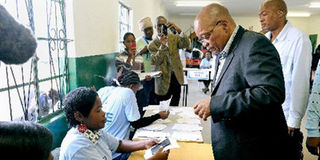SA ruling party in big win despite gains by opposition in local polls

A handout photo taken and released on May 18, 2011 by the South African government shows South African President Jacob Zuma preparing to vote at Ntolwane Primary school in Nkandla in KwaZulu Natal Province. AFP PHOTO / HO / SOUTH AFRICAN GOVERNMENT / ELMOND JIYANE
JOHANNESBURG, Thursday
South Africa’s main opposition made gains today in partial results from local polls, but most voters weren’t ready to ditch the ruling party despite growing anger over shoddy public services.
The African National Congress relied heavily on its glorious past as the party of Nelson Mandela that led the struggle against white-minority apartheid rule.
In power since Mandela became South Africa’s first black president in 1994, the party’s image has become tarnished by corruption scandals and its failure to provide jobs, water, electricity and housing for the poor.
Despite an explosion of anti-government protests in shantytowns, voters appeared unwilling to vent their anger at the ballot box, handing the ANC a 63 per cent majority, with nearly two-thirds of votes counted. That was about four points lower than its showing in the last local polls.
The main opposition Democratic Alliance held nearly 23 per cent of the vote. If that number holds, it would mark the party’s strongest-ever showing.
“The DA is the only party in this election that is going to show growth,” party leader Helen Zille said on national television, saying the returns showed that South Africans were increasingly willing to vote across racial lines.
“This election is showing... that we are the most non-racial party South Africa has ever had.” ANC secretary general Gwede Mantashe said the ruling party was “very disappointed” about its showing among racial minorities, who make up about 20 percent of the population.
“The ANC must work harder, we are not doing well in the minority areas,” Mr Mantashe said at the results centre in Pretoria. The shifting national tallies was resulting in few changes in municipal government.
The DA grew in popularity in Cape Town, where it has ruled since 2006, while the ANC looked set to maintain its grip on other major cities.
Nelson Mandela Bay, the municipality that includes the industrial city of Port Elizabeth, proved the closest of the major contests, with the ANC taking nearly 52 per cent.
Chief electoral officer Pansy Tlakula told a press briefing that she believed at least 40 per cent of the 23.65 million registered voters had turned out, compared with 48 per cent in 2006.
Final results are expected by the weekend. The Democratic Alliance, which succeeded a liberal white anti-apartheid party, actively campaigned in townships to lure new voters and shed its elitist image. Ms Zille sang and danced at rallies, greeted supporters in Xhosa, and showcased the DA’s management of Cape Town as a model of good government. (AFP)



